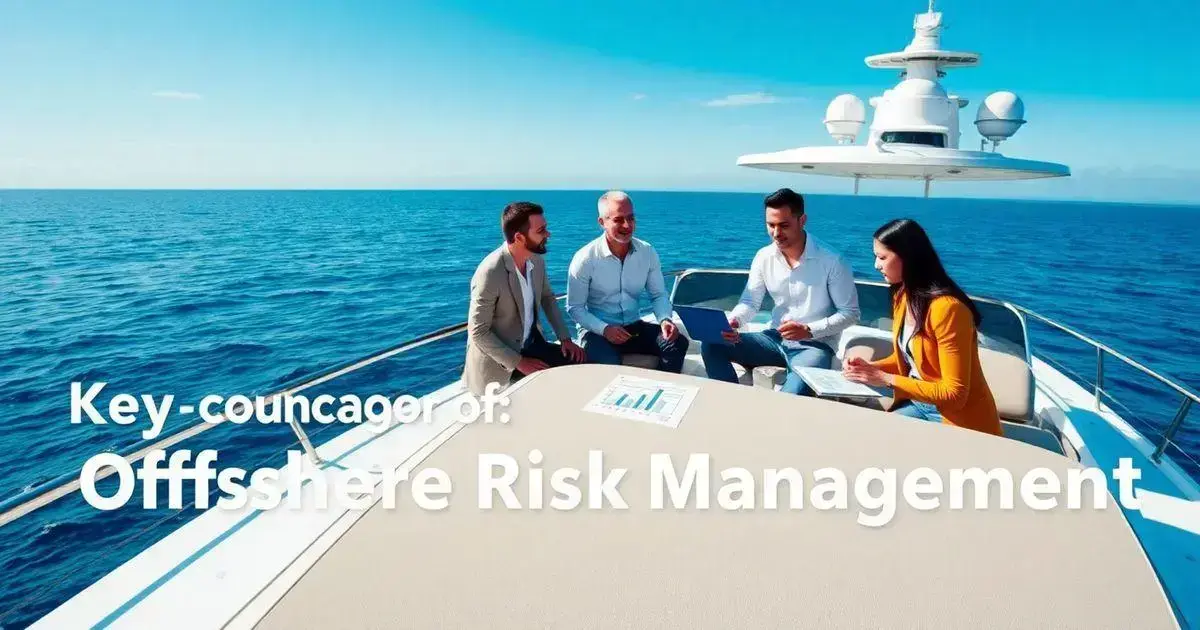Offshore risk management is essential for businesses operating internationally. It helps identify and mitigate risks that can arise from regulatory changes, economic instability, and more. By understanding these risks, companies can protect their investments and drive growth.
Effective offshore risk management involves assessing threats, staying updated on local laws, and adopting strategies to minimize exposure. With the right approach, businesses can navigate global markets confidently.
Keep reading to discover key strategies that will help safeguard your business in the offshore landscape.
Understanding Offshore Risk Management
Understanding offshore risk management is crucial for any business operating globally. It involves identifying, assessing, and prioritizing risks associated with overseas operations.
Companies that venture into international markets face various challenges, including regulatory changes, cultural differences, and financial instability. By effectively managing these risks, organizations can safeguard their investments and ensure sustainable growth.
Firstly, businesses must conduct thorough risk assessments. This process should involve gathering data on potential risks and analyzing their impact on operations. Utilizing tools such as SWOT analysis can help highlight key vulnerabilities and strengths.
Moreover, understanding the local laws and regulations where the business operates is imperative. Different countries have varying compliance requirements, and failing to adhere to them can result in heavy penalties. Therefore, keeping abreast of local legislation is part of effective offshore risk management.
Additionally, diversifying investments can mitigate risks. By spreading resources across various markets or products, companies can reduce the impact of adverse events in a specific area. This strategy helps protect the overall financial health of the organization.
In conclusion, a comprehensive approach to offshore risk management not only minimizes potential setbacks but also positions businesses to capitalize on new opportunities in the global market.
Key Benefits of Offshore Risk Management

Offshore risk management offers several key benefits for businesses looking to expand globally. Firstly, it helps in identifying risks that could impact operations and profitability. By understanding these risks, companies can make informed decisions and avoid potential pitfalls.
Moreover, effective offshore risk management leads to better regulatory compliance. Every country has its own laws, and managing risks ensures that businesses stay within these legal boundaries. This reduces the likelihood of costly fines and penalties.
Another crucial benefit is improved reputation. Companies that actively manage their offshore risks are seen as responsible and trustworthy by investors and customers alike. This positive perception can significantly enhance business opportunities.
Additionally, risk management strategies can also focus on financial stability. By anticipating economic fluctuations and creating contingency plans, businesses can protect their assets and ensure long-term sustainability.
Finally, a well-structured offshore risk management plan encourages innovation. By understanding risks better, companies can explore new markets and opportunities with greater confidence, leading to potential growth.
Risk Assessment Techniques for Offshore Ventures
Risk assessment techniques for offshore ventures are crucial for understanding potential challenges. One effective method is conducting a SWOT analysis, which helps identify strengths, weaknesses, opportunities, and threats related to offshore operations.
Another technique is the use of scenario analysis. This involves envisioning different future situations and assessing how they might impact the business. By preparing for various scenarios, companies can build resilience and readiness.
Additionally, financial modeling plays a significant role. Companies can create models to predict financial outcomes based on various risk factors. This helps in making informed investment decisions.
Moreover, engaging with local experts can provide valuable insights. Collaborating with professionals who understand the local market and regulatory environment can enhance risk assessments and facilitate smoother operations.
Finally, it is essential to regularly review and update risk assessments as conditions change. This iterative process ensures that businesses remain adaptable and can respond to new challenges effectively.
Legal Considerations in Offshore Risk Management

Legal considerations in offshore risk management are crucial for businesses navigating international markets. Companies must be aware of local laws that govern their operations. Each country has different regulations regarding taxes, labor laws, and environmental issues. Violating these laws can lead to serious penalties and damage to the company’s reputation.
A compliance audit is an effective way to ensure that all legal requirements are being met. This process involves reviewing the company’s practices and policies to align with local regulations. By conducting regular audits, businesses can stay ahead of any legal changes.
Intellectual property (IP) rights are also an important consideration. It is vital to protect your innovations and brand in each jurisdiction. Registering patents or trademarks in offshore markets helps prevent unauthorized use and protects your competitive edge.
Moreover, understanding contract law in the region is essential for executing agreements with partners and suppliers. Clearly written contracts help minimize misunderstandings and legal disputes.
Finally, having legal counsel familiar with offshore operations can guide businesses in adhering to laws and mitigating risks. An expert can provide valuable insights and help navigate complex legal environments to protect your business interests.
Implementing Effective Risk Mitigation Strategies
Implementing effective risk mitigation strategies is essential for businesses involved in offshore ventures.
The first step is to conduct a thorough risk analysis, which involves identifying potential risks and their impacts. This analysis helps prioritize which risks need immediate attention.
One effective strategy is to diversify investments across different markets. By not putting all resources into a single area, companies can minimize the overall risk. This way, if one market experiences difficulties, other investments can continue to perform well.
Additionally, creating a solid crisis management plan is vital. This plan should outline steps to take during unexpected events, ensuring businesses can respond quickly and effectively. Training employees on this plan is also essential to ensure everyone is prepared.
Furthermore, maintaining strong communication with local partners can help mitigate risks. Building good relationships can provide insights into local conditions and potential challenges, allowing for proactive decision-making.
Lastly, reviewing and updating risk mitigation strategies regularly helps businesses stay ahead of new challenges. An adaptable approach enables companies to respond swiftly to changing circumstances in offshore markets.
Real-life Case Studies in Offshore Risk Management

AI can significantly enhance the efficiency and effectiveness of various industries, addressing unique challenges and driving innovation.
For instance, in the multinational company sector, organizations often face challenges such as political instability and economic fluctuations. To overcome these hurdles, companies implement strategies like risk assessments, investment diversification, local partnerships, and engagement with local governments. As a result, they can successfully navigate new markets.
In the energy sector, companies encounter environmental risks and stringent regulations. By adopting environmental management systems and conducting compliance audits, they can enhance their reputation in the global market.
Similarly, technology firms face the challenge of cybersecurity threats. To mitigate these risks, they implement advanced security measures and provide employee training programs, resulting in a reduced risk of data breaches and increased client trust.
Future Trends in Offshore Risk Management
Future trends in offshore risk management are continuously evolving, and businesses must stay informed.
One key trend is the use of advanced technology to identify and mitigate risks. Technologies like artificial intelligence and machine learning can analyze large datasets, helping companies to spot potential risks before they become significant problems.
Another trend is the increased focus on sustainability. Companies are realizing that environmental and social governance (ESG) factors are critical to their risk management strategies. By considering these factors, businesses can improve their reputation and attract investors.
Furthermore, organizations are expected to strengthen their cybersecurity measures. As more business moves online, protecting sensitive data becomes crucial. Implementing robust security protocols and regular audits can help minimize cyber risks.
Additionally, there is a growing movement towards collaboration and transparency between companies and their stakeholders. By sharing information about risks and management strategies, businesses can foster trust and improve resilience.
Lastly, businesses will likely adopt more flexible strategies to quickly adapt to changing market conditions. This adaptability will help organizations manage risks more effectively in an unpredictable global environment.
Conclusion: Navigating the Offshore Risk Landscape

Navigating the offshore risk landscape requires a strategic approach. Businesses must first understand the various risks associated with international operations. This includes political instability, economic fluctuations, and regulatory challenges. By recognizing these risks, companies can devise effective strategies to minimize their impact.
Moreover, fostering strong relationships with local partners is crucial. These partnerships can provide businesses with valuable insights into market conditions and cultural dynamics. Such knowledge is essential for making informed decisions and mitigating risks.
Additionally, implementing a flexible risk management framework allows businesses to adapt quickly to changing circumstances. Regularly reviewing and updating risk assessments ensures that companies remain vigilant and prepared.
Training employees on risk management practices also plays a vital role. When staff are well-informed, they can contribute to a culture of risk awareness and prompt action.
Lastly, staying informed about industry trends and changes in the global market will help businesses navigate risks more effectively. By being proactive and adaptable, companies can successfully manage their offshore operations.
Offshore Risk Management: Conclusion
In summary, navigating the offshore risk landscape is essential for companies looking to thrive internationally. Businesses must stay informed about various risks, such as political instability and regulatory changes, to minimize their impact.
Building strong local partnerships provides crucial insights into market dynamics and can enhance decision-making efforts. A flexible risk management framework allows for prompt adaptation to unforeseen circumstances, ensuring ongoing success.
Training employees on risk awareness fosters a culture of vigilance, while regular reviews of risk assessments keep strategies up to date.
Finally, staying attuned to industry trends and shifts in the global market will empower companies to manage their offshore operations effectively and seize new opportunities.